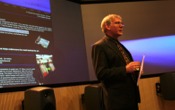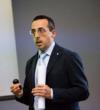Music Academy "Studio Musica"
Convenzionata con il Conservatorio "B. Marcello" di Venezia
You are here: 3rd International Conference on New Music Concepts (ICNMC 2016)
3rd International Conference on
New Music Concepts (ICNMC 2016)
July 7-8, 2016 Hong Kong
Keynote Lectures
Audio Literacy for Music Students: Issues and Solutions
 |
Christopher J. Keyes Hong Kong Baptist University Hong Kong |
Brief Bio
Christopher J. Keyes (b. 1963) began his career as a pianist, winning many competitions and later making his "dou-ble-debut" in Carnegie Hall as both soloist and guest composer with the New York Youth Symphony. He continued his musical training at the Eastman School of Music, completing his doctorate in 1992. His major composition teach-ers include Joseph Schwantner, Samuel Adler, Christopher Rouse, and Robert Morris. Among his numerous awards are a Rudolf Nissim award for best orhestral work by a living ASCAP member, the Eastman Szernovsky Award, sev-eral ASCAP Grants to Young Composers, and numerous scholarships including the University of California Under-graduate Research Fellowship in Physics. His compositions have been performed and broadcast in over 30 countries world -wide.
Since the late 1990s his work has focused on electro-acoustic music, multi-channel audio, and more recently com-puter graphics as mediums to expand the possibilities of acoustic instruments in concert. He is currently a sProfes-sor at Hong Kong Baptist University where he directs the Electro-acoustic Music Centre and the Laboratory for Im-mersive Arts and Technology.
Abstract
The increasing importance of 21st century music students being literate in audio technology must not be underestimated. Acquiring the knowledge and skills to use technologies creatively and fluently may further their careers in ways we may not yet imagine. However, the lack basic scientific knowledge and the non-comprehension of even the most basic scientific concepts can be a formidable obstacle for many music students. Other students may be well versed in audio technology on a lower, programming/patching level, but be completely unfamiliar with the equipment and professional standards of audio in formal concert settings and or for professional recordings that may greatly help disseminate their work.
In this study we introduced mobile applications specifically designed to target these pedagogical issues. This presentation will demonstrate these new pedagogical apps and discuss what we know so far about their effectiveness.
Detection of Historical Period in Symbolic Music Text
 |
Michele Della Ventura Accademia Musicale Studio Musica, Treviso Italy |
Brief Bio
Michele Della Ventura brilliantly graduated in pianoforte under the guidance of Francesco Bencivenga. Concurrently to the music studies he graduated in Technology Disciplines with the highest honors and distinction, obtaining a scholarship followed by a II level Master's Degree in e-Learning (e-Learning: methods, techniques and applications) at the University of Rome 'Tor Vergata'. He was valedictorian of his class with his master’s thesis ‘Learning and new technologies’.
His research interests are in:
- correlation between music and mathematics with a particular emphasis on artificial intelligence research in the field of computer-aided analysis of tonal music;
- use of web technologies for teaching.
He is the author of several articles published in international science magazines and high school textbooks (also featured at the International Book Salon of Turin in 2012).
He proofreads articles and is a member of scientific committees in International Conferences. He was invited as a lecturer to International Conferences in Italy, Canada, China, Czech Republic, France, Germany, Japan, UK, Romania, Singapore, Spain, US (Baltimora, Boston, Las Vegas, New York, Washington). He teaches Music Informatics in University courses at Music Academies and Conservatories and Musical Technologies in Music High Schools.
Abstract
Despite the various studies on computer-aided musical analysis, there have been relatively few attempts at trying to locate, by means of analysis, a given melody in a certain stylistic period (Baroque, Classical, Romantic or Contemporary). The main problem is that a compositional style of a certain historic period is difficult to formalize. This study presents a model of analysis based on the theories of Warren Weaver and Claude Elwood Shannon, able to progressively explore the symbolic level of a melody, identifying the historic period on the basis of the information that it carries. The concept of information has already been used for several years now in linguistic analysis and it has also been applied to musical language. This approach was dealt with on the melodic level, omitting concepts like tonality, modulation and moreover rhythm. The efficiency of the model was verified by analyzing a series of melodies by different authors and from different times (trying to range through the different compositional techniques by means of a unique analysis methodology) emphasizing both the strong points and the weak points of the approach.
- Important Dates
-
-
VIRTUAL PARTECIPATION
For presenters who will be unable to attend the conference in person.
Paper Submission
Before April 24, 2016
We would like to thank all who have already submitted their Paper. As many of you have requested, the deadline will be extended.
Before May 2, 2016
Notification of Acceptance
On May 22, 2016
Final Paper Submission
Before June 5, 2016
Authors' Registration
Before June 5, 2016
ICNMC 2016 Conference Dates
July 7-8, 2016
-
Music Academy "Studio Musica"
Via Andrea Gritti,25 - 31100 Treviso (Italy)
- P.Iva 03203960269
Via Andrea Gritti,

